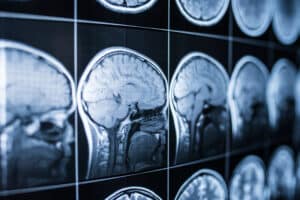
Seizure disorders can cause acquired brain injury (ABI).
There is a close correlation between seizure disorders and traumatic brain injury or other brain disorders. Disorders such as epilepsy can cause neural damage, placing a person at high risk for traumatic brain injury. A person who experiences an epileptic seizure could fall or suffer from a violent convulsion severe enough to damage the brain.
The Definition of a Seizure Disorder
A seizure disorder is essentially a disturbance or interruption in brain cell activity. The interruption triggers a degree of temporary brain dysfunction. There are two main types of seizure disorders:
Focal Seizures
Abnormal activity in a focal area of the brain can cause a seizure while you are fully conscious or exhibit impaired awareness. Common symptoms that accompany focal seizures include:
- Staring into space
- Abnormal responses to environmental stimuli
- Repetitive bodily movements
- Unexplained emotional changes
- Sensory changes (sight, smell, taste, feeling)
- Involuntary jerking
- Tingling, dizziness, flashes of light
Generalized Seizures
A generalized seizure starts when abnormal electrical impulses affect multiple areas of the brain. Generalized seizures involve both cerebral hemispheres and affect movement or responses throughout the entire body.
Common symptoms that accompany generalized seizures include:
- Loss of consciousness
- Involuntary jerking
- Loss of breath
- Grinding teeth or tongue biting
- Muscle contraction
- Drop attacks (head, limb, or bodily collapse)
How Atonic Seizures Lead to Acquired Brain Injury
Although specialists often categorize atonic seizures as generalized seizures, they differ from other types of disorders due to the severity of head trauma they can cause.
Atonic seizures produce an abrupt loss of muscle tone with no advance warning. They produce head drops, loss of posture, or sudden collapse. Therefore, people who experience them fall with force. The fall can result in head traumas as severe as acquired brain injury.
Other names for atonic seizures include:
- Drop attacks
- Astatic seizures
- Akinetic seizures
Seizure Disorder Diagnosis
After you experience your first or second seizure, your doctor will examine the possible causes of your seizures and what type of disorder you may have. Your doctor may perform a wide range of tests to give you a proper diagnosis and recommended treatment.
These are tests that you may undergo:
- A neurological exam
- Blood tests
- Lumbar puncture
- Electroencephalogram (EEG)
- Computerized tomography (CT) scan
- Magnetic resonance imaging (MRI)
- Positron emission tomography (PET)
- Single-photon emission computerized tomography (SPECT)
All evaluations assess your motor skills, cognitive function, nervous system, genetic conditions, and overall health. They also reveal any possible conditions you may have such as diabetes, epilepsy, or brain tumors. Together, these tests help your doctors assess when and why your next seizure is likely to occur.
Seizure Disorder Treatments
There are three main types of treatment you may undergo for your seizure disorder:
Medication
You may be able to control your epilepsy with anti-seizure medication. Your doctor can help you determine the right medication type and dosage.
Surgery
If medication does not control your epilepsy, you may want to seek out surgery as a viable option for improving your condition.
Therapy
You can utilize therapy as either an alternative or a supplement to medication and surgery. Three main types of therapy for seizure disorder patients include vagus nerve stimulation, ketogenic diet, and deep brain stimulation.
Contact a Brain Injury Lawyer Today for Your Acquired Brain Injury Case
If you are suffering from seizure disorders or acquired brain injury due to an accident caused by someone else, you may want to explore your legal options for recovering your economic damages.
Newsome | Melton offers legal services for victims of personal injury cases, including acquired brain injury cases. Learn more about how our brain injury lawyers can help by calling today at (800) 917-5888 to set up a free, no-obligation consultation.